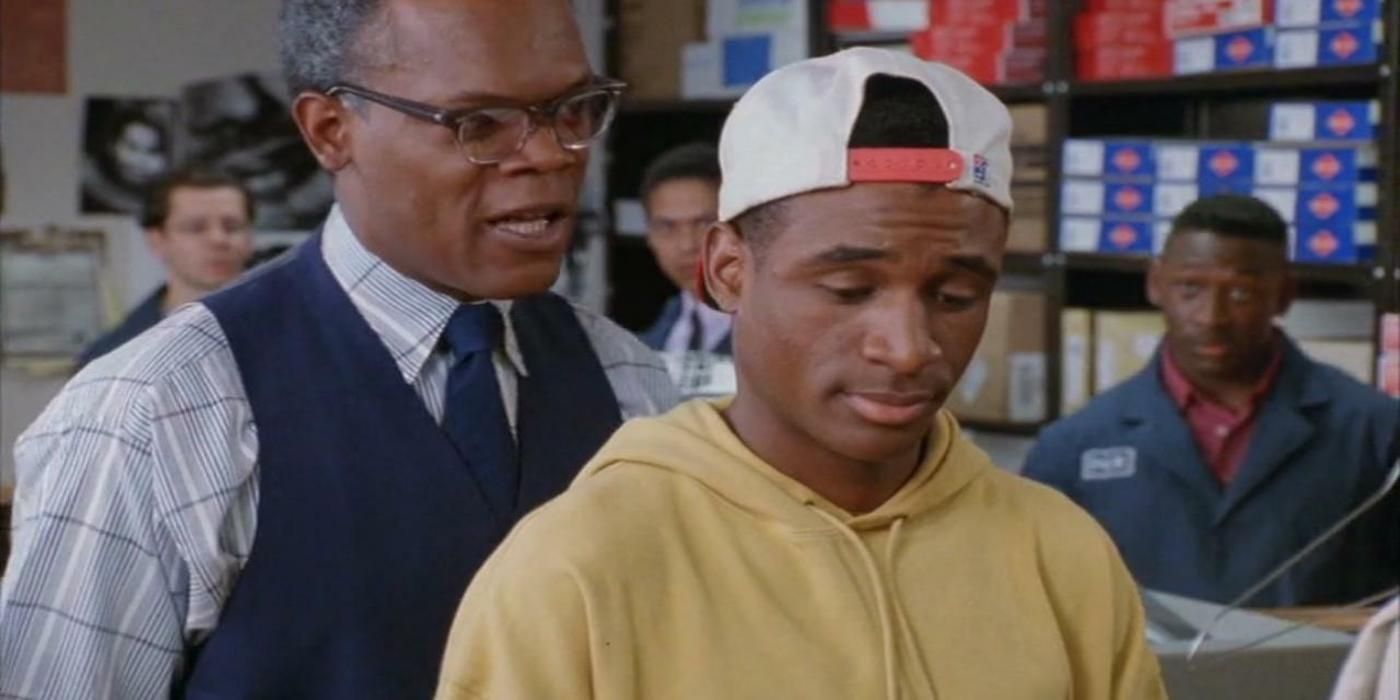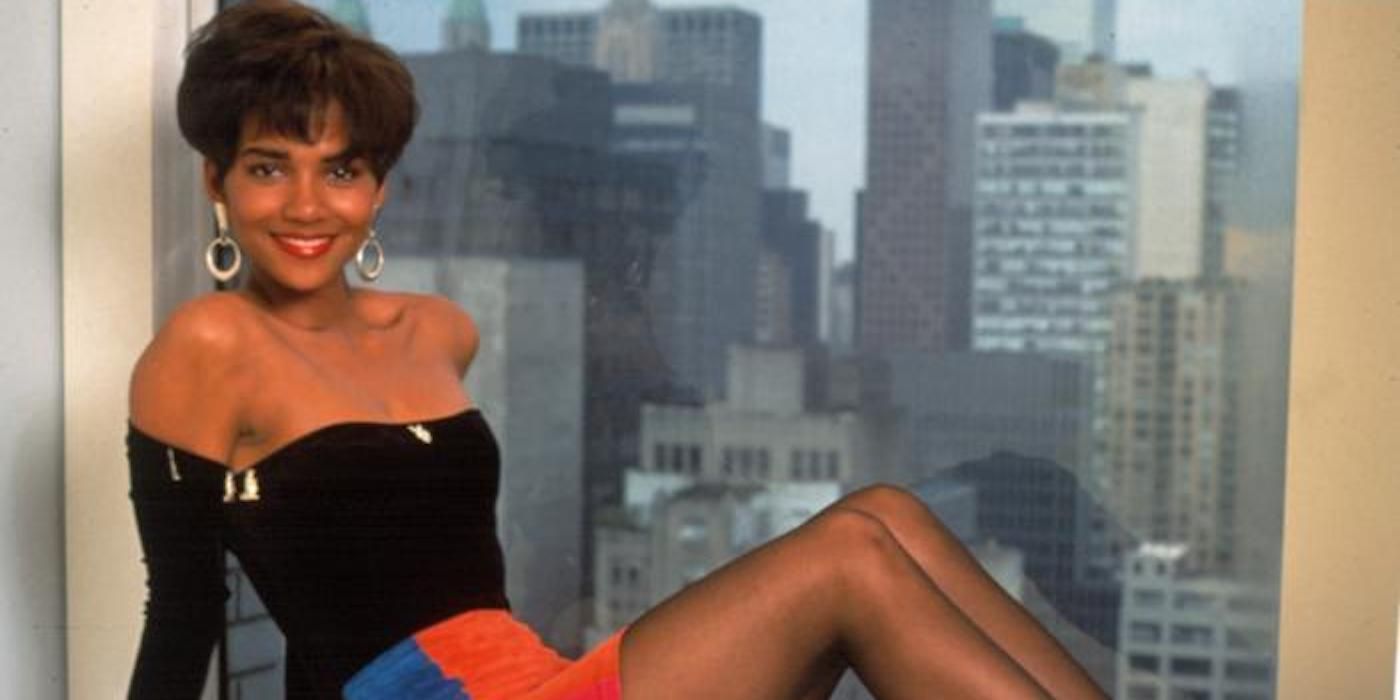From the very beginning of her career, Oscar-winner Halle Berry has shown she can play in any genre sandbox with a diverse set of performances: A drug addict in Spike Lee’s Jungle Fever, the weather-controlling mutant Storm in the X-Men franchise, a Bond girl in Die Another Day, an Oscar-winning turn as the widow of a man on death row in Monster’s Ball, and her current role as a single mother protecting her sons from an evil presence in Never Let Go. Halle Berry is a household name, and it all started back in 1991 with her first true starring role in the comedy, Strictly Business.
Strictly Business is a social satire that came during a boom period for contemporary Black cinema, pioneered by Spike Lee’s success. The New York-centric movie marked the directorial debut of Kevin Hooks (Passenger 57, Fled) and was co-written by music and culture journalist Nelson George. Berry was the third lead opposite In Living Color’s Tommy Davidson and The Cosby Show’s Joseph C. Phillips. The project was designed as a star vehicle for comedian Davidson, though it was Berry’s presence that got the industry to take notice. While Strictly Business did not receive a wide release in 1991, audiences who found the movie on video and cable over the years continue to talk about its themes of culture, class, and race within the corporate world.
What Is ‘Strictly Business’ About?
Strictly Business follows Waymon Tinsdale (Phillips), a successful, but uptight investment counselor for a Manhattan real estate firm. Though he’s in line to become a senior partner with the firm, Waymon is a strict workaholic in an unhappy relationship with the materialistic socialite Diedre (Anne-Marie Johnson). During a power lunch meeting, Waymon gets lovestruck by the restaurant hostess Natalie (Berry), a struggling dancer juggling her day job and moonlighting as a club promoter. Carrying around a professional headshot that Natalie accidentally left at the restaurant, Waymon discovers that his colleague Bobby (Davidson) personally knows Natalie from the club scene.
The Harlem-bound Bobby despises his mailroom job overseen by a condescending supervisor (Samuel L. Jackson) and constantly bothers Waymon about breaking him into the firm’s trainee program. Eager to meet Natalie, Waymon offers Bobby a proposal: If Bobby can hook him up with Natalie, he’ll make him his trainee once he closes a major real estate deal which would promote him to senior partner in the firm. In his pursuit of Natalie, however, Waymon has to shake up his all-business persona by having Bobby help him change his wardrobe choices and move around with more swagger.
‘Strictly Business’ Tackles Race Relations In The Corporate World
Strictly Business brings a great deal of ‘90s social commentary about race and class in a majority-white corporate landscape. This was unique for the period when movies geared towards Black audiences often dealt with crime and social issues in impoverished urban areas. Waymon initially carries himself as a highly educated professional like a Sidney Poitier character, and he’s the only black employee on the higher end of the firm. This presents professional challenges for Waymon as he’s under pressure from his white boss (Jon Cypher) to close an important real estate deal while competing against his subtly racist colleague David (David Marshall Grant), who wants to meddle with Waymon’s opportunity to get the partnership for himself.
Meanwhile, Waymon’s budding friendship with Bobby represents a culture clash within the Black community: The corporate book-smart businessman and the ambitious but free-wheeling trainee with the Harlem street smarts. From their first scene together with Bobby eating lunch in Waymon’s office while flirting with a woman over the phone, the investment counselor criticizes the hip mail clerk for his informal attitude in the workplace. Waymon’s initial feelings about Bobby are echoed by Jackson’s mailroom supervisor, who views him as a lowlife punk. Similarly, Bobby sees Waymon’s hectic personality as a turn-off to impress a free-spirited girl like Natalie. To win her heart, Waymon has to shed nearly all aspects of his dignified identity to meet Natalie on her level.
Strictly Business also deals with the concept of never judging a book by its cover. In a movie filled with Black stereotypes getting subverted, Waymon learns some serious lessons on making the wrong assumptions about people. At a time when New York City was just in the early stages of gentrification, boroughs like Harlem were perceived as crime-infested. Such perception is on Waymon’s mind when Bobby takes him to a Harlem nightclub to meet Natalie alongside a group of well-dressed older Black men. Waymon foolishly assumes they are some jive-talking gangsters. However, they later play an important role in Waymon’s business deal when they are revealed to be the owners of a major Harlem bank.
Additionally, Waymon’s trust in Bobby only goes halfway. While he relies on Bobby to set him up with Natalie, Waymon is more hesitant to take Bobby’s help at work, including the delivery of an important report to Japanese investors. When David and his naive trainee (Sam Rockwell in his third film role) tamper with the report to disrupt the deal, Waymon immediately blames Bobby without hesitation. Only when Waymon’s secretary brings up information absolving Bobby of wrongdoing does he realize the error of his ways. Bobby proceeds to scold Waymon over the issue he has faced from the start of the story: Black people passing judgment on their own.
Halle Berry Makes An Impressive Debut In ‘Strictly Business’
In her first role as a romantic lead, Natalie is not the traditional dreamgirl love interest to the protagonist. Beyond her incredibly beautiful looks and love for the club scene, Natalie has dreams of owning her own business. She spends part of the movie using her connections to make that breakthrough with little progress. Much like Waymon, Natalie is looking to make her way up the ladder in the majority-white business world. Her dreams only draw Waymon closer to her as the street-level world she comes from propels his success in an unlikely way.
The warmth and value of relationships that Berry brings to Natalie make her the polar opposite of Deidre. Waymon’s socialite girlfriend feels no emotional attachment to him. Deidre’s idea of a relationship is based on social status, where she perceives Waymon as a business partner she can control rather than a beau to support emotionally. In contrast, Natalie has a down-to-earth warmth that breaks past Waymon’s rigid exterior. He wants to support her dreams in addition to pursuing a meaningful romance. Soon, Waymon musters the courage to dump Deidre, breaking away from his Brooks Brothers attitude to use his successful business deal in the final act to help fund Natalie’s club.
While the comedy of Strictly Business continues to be enjoyed by audiences thanks to streaming, the layers of social commentary in the story make it more relevant today than in 1991. Davidson, Jackson, and Rockwell have since gone on to bigger projects with greater acclaim. Berry was singled out by the industry for her camera-friendly looks, immediately landing significant follow-up roles in The Last Boy Scout and Boomerang. But the nuances in her performance were only scratching the surface of what she was capable of as an actor.
Strictly Business is available to rent on Amazon in the U.S.
Rent on Amazon






